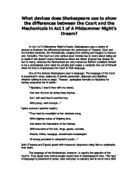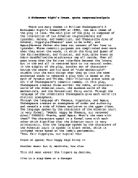“Hippolyta, I woo’d thee with my sword,
And won thy love by doing these injures,
But I will wed thee in another key,
With pomp, with triumph...”
Egeus accuses Lysander angrily;
“Thou hast by moonlight at her windows sung,
With feigning voices of feigning love,
And stolen the impression of her fantasy,
With bracelets of thy hair, rings, gauds, conceits,
Knachs, trifles, nosegays, sweetmeats-messengers
Of strong prevalent in unharden’d youth...”
Both (Theseus and Egeus) speak with measured eloquence using lists to emphasise their point.
The language of the Mechanicals, however, is exactly the opposite of the Court’s. They speak how normal people would have in Shakespeare’s time. This type of language is presented in prose, uses everyday vocabulary and is much more brief in expression. Peter Quince has the idea of performing a play to celebrate Theseus and Hippolyta’s wedding. He has to be diplomatic in checking Bottom from dominating the proceedings. All are unsophisticated:
Bottom: “First good Peter Quince, say what the play treats on; then read the actor’s names; and so grow to a point.”
When Quince names Bottom Pyramus, the lover, Bottom boasts:
“That will ask some tears... let the audience look to their eyes, I will make storms.”
Another device Shakespeare uses is imagery. The Court have beautiful imagery such as the lovers condition: Theseus warns Hermia of her possible fate:
“for aye to be in shady cloister mew’d... chanting faint hymns to the cold fruitless moon.”
Helena complains to Hermia:
“Your eyes are lodestones, and your tongue’s sweet air more tunable than
lark to shepherd’s ear,
When wheat is green, when hawthorn buds appear.”
Lysander speaks of their escape plan:
“Tomorrow night when Phoebe doth behold,
Her silver visage in the watery glass,
Decking with liquid pearl, the bladed grass...
Through Athens’ gates we have devis’d to steal.”
The Mechanicals imagery is crude and comical:
“The raging rocks
And shivering socks
Shall break the locks.”
One thing that clearly shows a difference between the Court and the Mechanicals is how Shakespeare has decided to name the characters. The characters of the Court have names that are long, aristocratic, formal and classical. Examples of these include: Theseus, Hippolyta and Lysander. The characters of the Mechanicals have names that are comical and sometimes relate to their job. Examples of these include: Snout (the tinker’s snout repairs) and Flute (the bellow’s novice).
Bottom is the character who tries to imitate educated language, but the harder he tries the worse his mistakes are. He uses “obscenely” instead of “seemly”. He tries to express “no more choice” by “no more discretion” which means “no more sense”.
In conclusion then, Shakespeare uses a variety of devices to show the differences between the Court and the Mechanicals in Act I of A Midsummer Night’s Dream but we do not know the theatre’s capabilities, the actor’s capabilities ,the costumes that they wore, or the props available so we will never know what differences were shown in the devices of stagecraft as we weren’t there! We can only guess at these by studying the playwright. The differences we do know about range from language to names. In Act 1 Shakespeare shows us the two different mortal worlds of Athens maybe we will see more language devices and different types of characters (e.g. the fairies) in Act II.
By Harry Wilson 7.1







